 The candles are lit and the following blessings are recited (red inserts are for Shabbat only):
The candles are lit and the following blessings are recited (red inserts are for Shabbat only):The table is set in the sukkah festively for the holiday. Two or more candles are set out, and two loaves of challah are placed on a board and covered with a cloth. Some people remove knives, implements of violence and war, from their table until all the blessings have been recited. If you are not familiar with all the blessings below, begin with those you know and slowly learn more until you find your comfort level.
 The candles are lit and the following blessings are recited (red inserts are for Shabbat only):
The candles are lit and the following blessings are recited (red inserts are for Shabbat only):

Blessed are You, Lord our God, Ruler of the universe, who makes us holy with commandments and commanded us to kindle the lights of (Shabbat) and the holy day.

Blessed are You, Lord our God, who has kept us alive and sustained us, and allowed us to reach this season.
It is customary for parents to bless their child(ren) on Shabbat and festivals. You might say anything positive you wish to your child(ren) at this time, reflecting upon special moments during the past week, and/or use the traditional blessing below.
For daughter(s):
May God bless you and make you like Sarah, Rebecca, Rachel, and Leah.
For son(s):
May God bless you and make you like Ephraim and Manasseh.
For both daughter(s) and son(s):
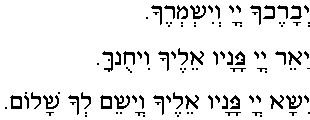
May God bless you protect you.
May God lift the divine countenance to you and be gracious to you.
May God's countenance shine upon you and grant you peace.
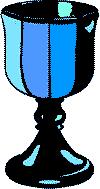 The Kiddush over the wine is recited:
The Kiddush over the wine is recited:

And there was an evening and there was a morning, a sixth day. The heaven and earth and all their array were completed, God having completed the work which God had done on the sixth day. God rested on the seventh day from all the work which God had done. God blessed the seventh day and sanctified it for on that day God rested from all the work of creation which God had done.
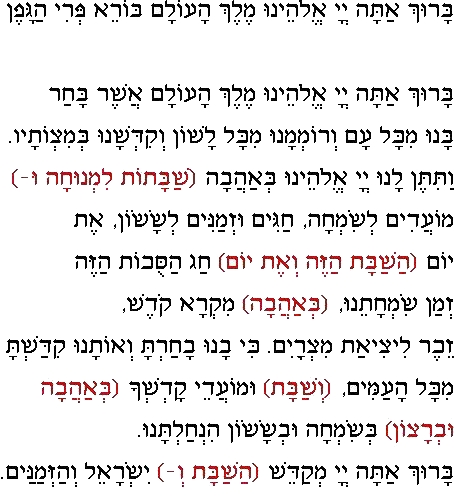
Blessed are You, Lord our God, Creator of the fruit of the vine.
Blessed are You, Lord our God, Ruler of the universe, who has chosen us from among all the peoples and sanctified us with commandments. Lord our God, You have given us in love (sabbaths for rest and) festivals for joy, and holy days for happiness, including (this Shabbat and) this holiday of Sukkot, festival of our joy, (in love), a sacred convocation, a commemoration of the Exodus from Egypt. For You have chosen us from among all peoples and sanctified us by giving us (the Shabbat and) holy festivals (in love and in favor) in happiness and in joy. Blessed are You, Lord, who sanctifies (the Shabbat and) Israel and the Festivals.
On Saturday night, we make a distinction between the holy time that was Shabbat and the holy time that is Sukkot by reciting the following blessings:
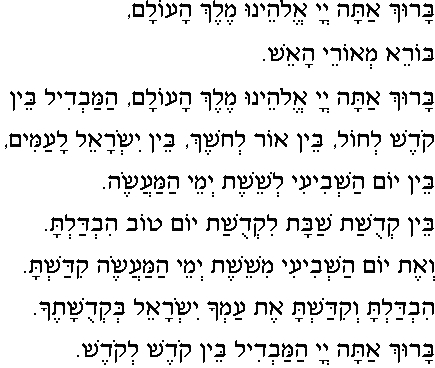
Blessed are You, Lord our God, Ruler of the universe, who creates the lights of the fire.
Blessed are You, Lord our God, Ruler of the universe, who distinguishes between the holy and the mundane, between light and darkness, between Israel and the nations, between the seventh day and the six days of Creation, between the holiness of Shabbat and the holiness of the holiday. You have sanctified the Seventh Day above the Six Days of Creation and You have distinguished and sanctified Your people Israel through Your holiness. Blessed are You, Lord, who distinguishes between the holy and the holy.

Blessed are You, Lord our God, who has kept us alive and sustained us, and allowed us to reach this season.
Dwelling in the sukkah is, itself, a commandment, and our sitting and partaking a meal in the sukkah fulfills this mitzvah, hence the following blessing is recited:

Blessed are You, Lord our God, who makes us holy with commandments and has commanded us to dwell in the sukkah.
Washing hands: In symbolic remembrance of the ritual of old in the Temple in Jerusalem, many people wash their hands prior to saying the blessings over food. Customarily, people use a small pitcher set aside for the occasion and pour water over each hand twice.

Blessed are You, Lord our God, who makes us holy with commandments and has commanded us concerning the washing of hands.
Blessing over bread:

Blessed are You, Lord our God, Ruler of the universe, who brings forth bread from the earth.
The festival meal is eaten.
Kiddush is recited upon returning from synagogue (red inserts are for Shabbat only):

The people of Israel shall keep the sabbath, observing the sabbath throughout their generations as an eternal covenant. It is a sign between Me and the People of Israel for ever. For in six days God made the heaven and the earth and on the seventh day God rested.
Blessed are You, Lord our God, Creator of the fruit of the vine.
Washing hands:

Blessed are You, Lord our God, who makes us holy with commandments and has commanded us concerning the washing of hands.
Blessing over bread:

Blessed are You, Lord our God, Ruler of the universe, who brings forth bread from the earth.
The festival meal is eaten.
You might also like to recite the prayer of Rabbi Nachman of Bratzlav as you sit in the sukkah:
Master of the universe, grant me the ability to be alone;
may it be my custom to go outdoors each day,
among the trees and grasses, among all growing things,
there to be alone and enter into prayer.There may I express all that is in my heart,
talking with God to whom I belong.And may all grasses, trees, and plants awake at my coming.
Send the power of their life into my prayer,
making whole my heart and my speech
through the life and spirit of growing things,
made whole by their transcendent Source.O that they would enter into my prayer!
Then would I fully open my heart in prayer, supplication, and holy speech;
then, O God, would I pour out the words of my heart before Your presence.
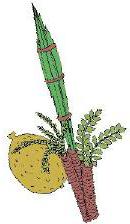 Waving the lulav and etrog in the sukkah is also a mitzvah. They are taken together in both hands and waved in the four compass directions as well us upward toward heaven and downward toward the earth, signifying that God is everywhere. The blessing recited is:
Waving the lulav and etrog in the sukkah is also a mitzvah. They are taken together in both hands and waved in the four compass directions as well us upward toward heaven and downward toward the earth, signifying that God is everywhere. The blessing recited is:

Blessed are You, Lord our God, Ruler of the universe, who makes us holy with commandments and has commanded us concerning the waving of the lulav.